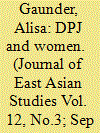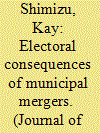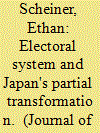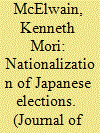|
|
|
Sort Order |
|
|
|
Items / Page
|
|
|
|
|
|
|
| Srl | Item |
| 1 |
ID:
117077


|
|
|
|
|
| Publication |
2012.
|
| Summary/Abstract |
The Democratic Party of Japan (DPJ) came to power in 2009 promising significant transportation sector reform, but it has struggled to implement its proposals. I argue that the DPJ's initiatives faltered due to the legacy of "efficiency clientelism." Historically, Japanese transportation policy combined two imperatives: (1) encourage efficiency by raising the cost of energy-inefficient transportation, and (2) redistribute benefits to supporters of the incumbent Liberal Democratic Party (LDP). Because of the legacy of efficiency clientelism, DPJ campaign pledges-designed to appeal broadly to the general public by reducing transportation costs- ran up against the prospect of sharp declines in revenues and energy efficiency. Efficiency clientelism was well suited to political realities in Japan prior to the 1990s, but recent developments have undercut its viability. This raises profound questions about the sustainability of Japan's energy efficiency achievements.
|
|
|
|
|
|
|
|
|
|
|
|
|
|
|
|
| 2 |
ID:
117078


|
|
|
|
|
| Publication |
2012.
|
| Summary/Abstract |
The Democratic Party of Japan (DPJ) saw forty of its forty-six female candidates elected in the 2009 lower house election; twenty-six were first-time candidates. Recently, both the Liberal Democratic Party (LDP) and the DPJ have supported more women as "change" candidates in response to changing electoral incentives that favor broad appeals. The DPJ's victory, however, has not had a large impact on women in terms of governance or policy. An exploration of child allowance, day care provision, and dual surname legislation under the DPJ reveals that low seniority and the lack of a critical mass have prevented DPJ women from overcoming significant veto points. The electoral incentives of the emerging two-party system have resulted in a larger number of women in office, but the volatility of the system has sustained a weak voice for women in policymaking.
|
|
|
|
|
|
|
|
|
|
|
|
|
|
|
|
| 3 |
ID:
117076


|
|
|
|
|
| Publication |
2012.
|
| Summary/Abstract |
The dominance of Japan's Liberal Democratic Party (LDP) was long buttressed by the existence of a strong political support base in the rural areas led by local politicians who worked on behalf of national LDP politicians seeking reelection. In recent years, municipal mergers have drastically weakened the LDP's support base by reducing the number of local politicians and redrawing electoral district boundaries. Surprisingly, the main opposition party, the Democratic Party of Japan (DPJ), could not take full advantage of these new institutional arrangements. Instead, local politicians have become more independent of both major parties. As a result, at a time of increasing numbers of floating voters, neither of Japan's two major parties has a reliable local base across the country. To succeed, both parties must pay attention to the changing needs of the increasingly independent-and very often still rural-localities.
|
|
|
|
|
|
|
|
|
|
|
|
|
|
|
|
| 4 |
ID:
117075


|
|
|
|
|
| Publication |
2012.
|
| Summary/Abstract |
Japan's electoral system, which emphasizes first-past-the-post, single-member district rules, has led the country's party system to become consolidated around the Liberal Democratic Party (LDP) and Democratic Party of Japan (DPJ). At the same time, Japan's electoral rules also made it likely that the two parties would not differ markedly in their policy positions, as well as hinder the emergence of new partisan alignments that could offer more clearly distinct policy options. Put differently, Japan's electoral rules have encouraged the development of what is essentially a two-party system, but one in which party alternation in power need not produce sharp policy change.
|
|
|
|
|
|
|
|
|
|
|
|
|
|
|
|
| 5 |
ID:
117073


|
|
|
|
|
| Publication |
2012.
|
| Summary/Abstract |
In 2009, the Democratic Party of Japan (DPJ) brought an end to the long reign of the Liberal Democratic Party (LDP). However, despite high expectations, this politically transformative event has not unleashed significant policy change in Japan. We highlight five electoral factors that have acted as important constraints on policy change under DPJ rule. First, majoritarian electoral rules have led to a convergence in the policy positions of the two major political parties. Second, as the parties' policy positions have become more similar, voters have increasingly cast ballots based on "valence" (i.e., nonpolicy) evaluations. Third, large national vote swings have limited the tenure of young, inexperienced candidates who might otherwise serve as the instigators of reform. Fourth, Japan's electoral rules permit inconsistency across policy positions within parties and discourage greater policy coherence. Fifth, the continuing influence of rural regions has limited the scope of policy reform under the DPJ.
|
|
|
|
|
|
|
|
|
|
|
|
|
|
|
|
| 6 |
ID:
117074


|
|
|
|
|
| Publication |
2012.
|
| Summary/Abstract |
The postwar electoral dominance of the Liberal Democratic Party (LDP) was founded on (1) strong incumbency advantage, which insulated its legislators from declining party popularity, and (2) the malapportionment of districts, which overvalued the electoral clout of the party's rural base. The LDP's demise in 2009 was due to the reversal of both factors, each of which was related to electoral reforms in the 1990s. First, I demonstrate that elections are becoming more "nationalized," due to the growing weight that voters attach to the attractiveness of party leaders. Past performance has become a poorer predictor of incumbent reelection, giving way to large partisan swings that are increasingly correlated across districts. Second, malapportionment was reduced by almost half in 1994, meaning that rural votes are now worth fewer seats. As a result, parties that can attract swing voters nationally are better positioned for victory than those with a narrow regional base.
|
|
|
|
|
|
|
|
|
|
|
|
|
|
|
|
|
|
|
|
|